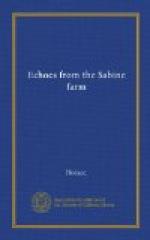Let not To-morrow, but To-day,
Your ever active thoughts engage;
Frisk, dance, and sing, and have your fling,
Unharmed, unawed of crabbed Age.
Let’s steal content from Winter’s wrath,
And glory in the artful theft,
That years from now folks shall allow
’T was cold indeed when we got left.
So where the whisperings and the mirth
Of girls invite a sportive chap,
Let’s fare awhile,—aha, you smile;
You guess my meaning,—verbum
sap.
A ROMAN WINTER-PIECE
II
Now stands Soracte white with snow, now bend the laboring
trees,
And with the sharpness of the frost the stagnant rivers
freeze.
Pile up the billets on the hearth, to warmer cheer
incline,
And draw, my Thaliarchus, from the Sabine jar the
wine.
The rest leave to the gods, who still the fiercely
warring wind,
And to the morrow’s store of good or evil give
no mind.
Whatever day your fortune grants, that day mark up
for gain;
And in your youthful bloom do not the sweet amours
disdain.
Now on the Campus and the squares, when evening shades
descend,
Soft whisperings again are heard, and loving voices
blend;
And now the low delightful laugh betrays the lurking
maid,
While from her slowly yielding arms the forfeiture
is paid.
TO DIANA
O virgin, tri-formed goddess fair,
The guardian of the groves and hills,
Who hears the girls in their despair
Cry out in childbirth’s cruel ills,
And saves them from the Stygian
flow!
Let the pine-tree my cottage near
Be sacred to thee evermore,
That I may give to it each year
With joy the life-blood of the boar,
Now thinking of the sidelong
blow.
TO HIS LUTE
If ever in the sylvan shade
A song immortal we have made,
Come now, O lute, I prithee come,
Inspire a song of Latium!
A Lesbian first thy glories proved;
In arms and in repose he loved
To sweep thy dulcet strings, and raise
His voice in Love’s and Liber’s praise.
The Muses, too, and him who clings
To Mother Venus’ apron-strings,
And Lycus beautiful, he sung
In those old days when you were young.
O shell, that art the ornament
Of Phoebus, bringing sweet content
To Jove, and soothing troubles all,—
Come and requite me, when I call!
TO LEUCONOeE
I
What end the gods may have ordained for me,
And what for thee,
Seek not to learn, Leuconoee; we may not
know.
Chaldean tables cannot bring us rest.
’T is for the best
To bear in patience what may come, or
weal or woe.




